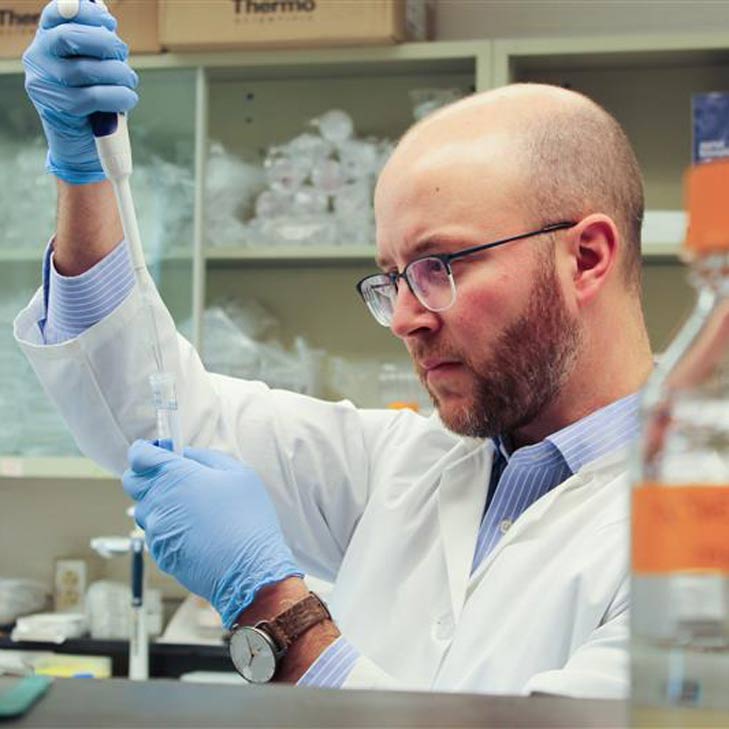 Tom Mendel, MD, PhD, and his lab members developed a method for adjuvant-assisted retinal gene therapy.
Tom Mendel, MD, PhD, and his lab members developed a method for adjuvant-assisted retinal gene therapy.
The Foundation for Fighting Blindness awarded Dr. Mendel’s retina lab a Career Development Award. It’s the first time the foundation has directly funded research at the Ohio State Wexner Medical Center. The lab will receive $75,000 a year for five years.
“Our focus is different,” Dr. Mendel says. “We use a gene agnostic surgical approach that ultimately could be used to deliver gene-specific therapy to patients with molecularly different types of inherited retinal disease.”
Advancing care for inherited retinal diseases
The adjuvant-assisted method advances and builds upon existing Luxturna therapy and the previously published “peel and puddle” procedure, which is a variation of the common technique used for treating macular holes and other retina repairs.
Luxturna, the first FDA-approved retinal gene therapy, injects a gene cargo under the retina. The procedure requires retinal detachment and is only approved to treat one specific condition. Dr. Mendel says that in up to 25% of patients, the retinal pigment cells at the injection site become thin and die.
“This threatens the long-term viability of that approach,” he says.
As an alternative, Dr. Mendel’s team tried placing the gene cargo on top of the retina and tracked absorption rates. The peel and puddle procedure first removes the internal-limiting membrane and then fills the eye with air. The gene therapy cargo is then injected and falls to the back of the eye where it puddles onto the back of the retina and is absorbed.
One goal of Dr. Mendel’s research was to determine how quickly they could deliver the genes into the retinal cells, doing so on the order of minutes with assistance of an adjuvant that increases viral absorption speed so that excess adeno-associated virus isn’t left in the eye, but rather removed at the conclusion of the surgical procedure. This reduces the risk of inflammation and avoids the risk of gene delivery to other parts of the eye.
Preclinical trials in mice and pigs show positive results.
“Our approach massively reduces inflammation from the start,” Dr. Mendel says. “And we don’t have to detach the retina. Doing so when the retina is thin and sick, as is often the case in inherited retinal disease, can be challenging for the retina.”
A space shuttle approach
The foundation grant gives the Mendel Retina Lab the support it needs to complete large-scale studies and perfect their procedure.
Dr. Mendel also wants to:
- Better understand the time dynamics of each type of retinal cell and how long it takes different cells in the retina to absorb the gene cargo.
- Further characterize the changes to cellular function in different locations in the retina with mentor and collaborator Andy Fischer, PhD.
- Determine the right adjuvant dose for the most efficient procedure.
The team is preparing its first paper for publication.
Ultimately, Dr. Mendel hopes to gain Food and Drug Administration approval for the adjuvant-assisted delivery method.
“I see it as a space shuttle approach,” Dr. Mendel says. “Once we have the go-ahead for the gene agnostic delivery technique, we could switch out the specific gene to treat any inherited retinal disease.”
Dr. Mendel says he’s already talking with mentors like Krystof Bankiewicz, MD, PhD; Russell Lonser, MD; and Arthur Burghes, PhD, Ohio State’s Gene Therapy Institute about future regulatory requirements to ensure success down the line for patients.down the line for patients.
Motivated to find a cure
Dr. Mendel cares for more than 300 patients with retinal conditions in his clinics at the Ohio State Wexner Medical Center and at Nationwide Children’s Hospital.
“For the vast majority of them, I can offer no cure today,” he says. “That is tough. It is personal for me.”
The motivation to find a cure is what pushes Dr. Mendel every day. His clinical care team includes ophthalmically specialized genetic counselor Taylor Sabato, MPH, MMSc, LGC; inherited retinal disease clinical care coordinator Lindsey Pyers, COA, CCRP; and clinic lead Trish French, COA.
He anticipates seeing rapid movement toward better treatments within five to 10 years.
The expanded relationship with Foundation Fighting Blindness will be instrumental, Dr. Mendel says.
A partnership already exists on the clinical side between the foundation and the department. Dr. Mendel often uses foundation resources to help patients access genetic testing and information about their condition.
He also participates in foundation fundraising efforts through the annual VisionWalk, and he spoke at the group’s Visions 2024 meeting in Chicago.
